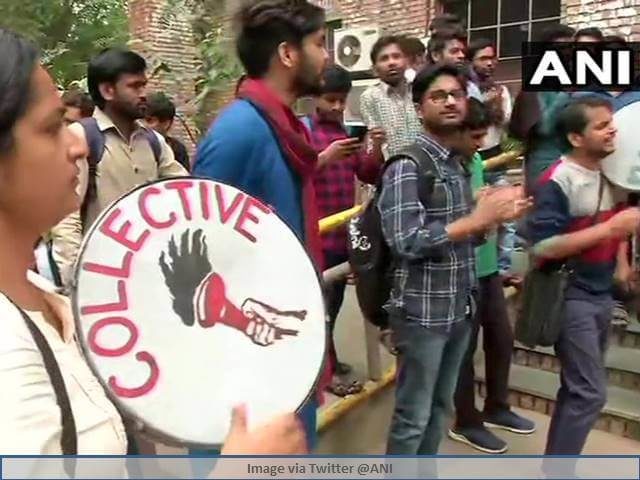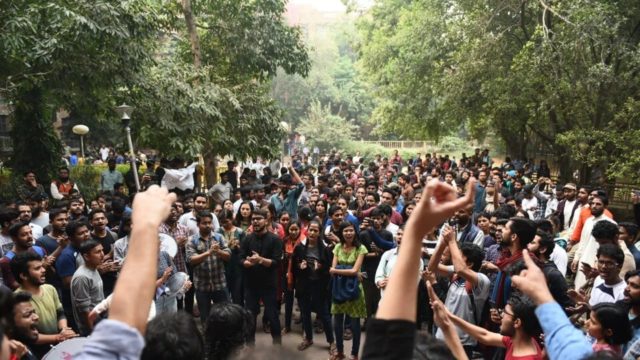A fee hike has become common in many colleges across India since the educational funds are not as much as the institutes would like.
To a certain extent, fee hikes are inevitable, with changing economy, surging prices, new facilities and increasing students. In these cases, a slight increase in fees and other college expenses are to be expected.
Then there are also times when colleges do increase fees and other charges to an extent which is highly unfair to the students and can also lead them to dropping out of the course.
However, the recent protests in JNU over their hostel fee hike is putting up some questions as to how valid their arguments really are.
Is a slight increase in the JNU hostel fees really that big of a problem to the students where they are protesting so much?
What IS JNU Protesting About Now?
Last week news broke out how many students from Delhi’s Jawaharlal Nehru University were protesting against the new Inter Hall Administration manual.
Allegedly, it introduced a steep hike in the hostel fees along with several arbitrary rules regarding “dress code” for mealtimes, curfew of 11 pm for students, restricting male and female students from entering the other gender’s hostel, etc.
It was also said that administrative action will be taken if the amended rules were not followed and protests and demonstrations were not allowed either.
This all happened on 29th October and it was after this that the Jawaharlal Nehru University Students Union (JNUSU) decided to call for a protest the next day.
According to reports, the JNUSU said that the meeting for the IHA manual change did not have a representative from their side and thus could not be fair.
Saket Moon the JNUSU vice-president has also reported revealed the revised amount, “We now pay around Rs. 2,000 per month as hostel fee. We’ve heard they are planning to levy service charges of Rs. 1,700, and around Rs. 300 as rent, making it at least Rs. 4,000.”
Is The Protest Fair?
The hike also does not seem as extreme or unfair as has been seen in cases of other fee hikes across universities in the country.
Not that long ago, in June of 2019 news broke out of how National Law School of India University (NLSIU), Bengalore had drastically increased the fees for their B.A. LL.B. (Hons.) course.
The hike was of a whopping Rs. 47,000 which took the earlier fees of Rs 1.838 lakh per annum to Rs. 2.305 lakh pa.
This is after a fee hike was already introduced in 2015 to adjust for inflation which increased the fees from the earlier Rs. 1.635 lakh. This equalled to a 12% increase and now again in 2019 added 25% over it.
Along with this there was also an increase in “Infrastructural fees”, which had a 56% increase from Rs. 12,000 to Rs. 18,750 and an additional Rs. 15,000 for “electricity charges.”
Even their medical fee had a hike which was tripled to Rs. 3,750 from the earlier Rs. 1,000.
All this was done in an extremely sneaky manner where the notice was discretely put up on the college website instead of the students getting a mail notification.
In September there was also protest by IIT students over their decision to hike the fees for their M.Tech course. While earlier it used to be between ₹20,000 and ₹50,000 the revised figure could be around Rs. 2 lakh annually.
Even here the protest was valid since many students complained about outdated curriculum and teaching methods.
Their point of contention was the fact that the low level of education at the IIT did not qualify them to ask such a high fees from their students who were already coming from economically challenged backgrounds.
We also wrote about the unfair fee hike in GGSIPU college. Read about it here.
Read More: Is The Hike In The IIT M.Tech Fees Justified?
What Does JNU Have To Say To This?
JNU has come forward in a statement to clarify that the issues about curfew and dress code are nothing but rumours. They’ve asked students to not give into misinformation
Along with this, registrar Pramod Kumar also said in a statement that, “The revision of the rates of the IHA committee has been done after more than a decade. For example, room rents were not revised in the last three decades.”
The JNU statement also revealed that there was a curfew in the earlier manual, where students had to return to hostel by 11 pm or 30 minutes after the library closed their reading room.
However the university in a press note said that, “Since the library reading room used to be closed by 12 in the midnight, as per the old rule, students have to reach the hostel by 12.30 am. However, now the library reading room is open 24/7. Therefore, in effect, as per either the old rule or new rule, students can reach the hostel any time.”
Rakesh M.A. a Quora user has also given some numbers on what the expense as a JNU student is for various facilities. As per his answer he studied in JNU from 2013-18:
“Admission fees —less than Rs. 300.
Tuition Fess— less than Rs. 300 per year.
Hostel fees — Rs. 1400–1600 per year (at the entry time, you will have to pay around Rs 3000 and half of the amount is refundable.
Mess charge (food)— Rs. 1700–2300 per month (it depends on the hostel, where are you living).
And if your family income is less than 2,50,000 per year, then JNU will provide you a scholarship of Rs 2000/- per month(for BA and MA students) and Rs. 5000/-(for M.Phil. students). So here, your mess charge is balanced.
Now come to the study material and daily expenses- It depends on the subject and you will have to buy very fewer books. Sometimes you will have to purchase the photocopied item in numbers and this is not costly (I think). You can borrow books from the library also. You will have to buy your daily routine things your own, e.g clothes, mattress, bucket, detergents, soap etc.
JNU provides you health (medical) facilities free of cost.
So, the average expense may dangle between Rs. 1000- 2500 per month (my personal opinion).
Note: I have studied in JNU for five years (2013–2018) and I did not take money from home. I managed my expenses with a scholarship given by JNU and above all, seniors and classmates were very supportive (I bet you will find some of your best friend and seniors also in JNU).”
In fact, there have also been reports of how protesting students had prevented doctors from taking Umesh Kadam, the Dean of Students (DoS) to the hospital after he fell ill at the IHA meeting venue. Students on their part stated that the Dean was just faking having ill health.
The Dean though has not revealed from their side what is the official revised hostel fees.
Frankly, the students are not entirely wrong in their protest, since many do come from not that well-to-do families. Shubhojit, a PhD scholar at the Centre for Study of Regional Development also revealed to NewsClick that, “I checked out the previous years’ annual reports of the university. In one of the reports, the university has accepted that almost 60% students hail from families with incomes below Rs 1 lakh per annum. In this situation, the administration is asking the students to pay almost Rs 4,200 per month. If we multiply it with 12, we find that a sole student will have to pay Rs 50,400 per annum. Can these families afford this amount?”
But at the same time, one has to think about the fact that this change is being made after almost 30 years.
Also the increase is not so extreme as being made out and neither are these changes in any way curbing on human rights where the need to protest against arises.
In regards to curfew and such, pretty much every university whether domestic or international has it, so it is not something exclusive being levied on the students of JNU.
Everyone has curfew, institutions like schools and colleges all work on maintaining discipline among their students. And most of these regulations on paper don’t seem to be wrong or against the interest of the students.
Another thing to think about is the low education budget which does not allocate adequate funds to be given to such state or government funded universities.
The fact that the tuition fees of JNU is already so low along with all the subsidies and other measures it has to help students, this hostel fee hike does not really warrant a protest.
Image Credits: Google Images
Sources: Legally India, Livemint, Business Standard
Find the blogger @chirali_08



































So I wonder, what was the income of the family of students vis a vis the fees charged 30 years back? When the last hike happened? Sure some protests would have happened if that fee reflected a steep ratio.